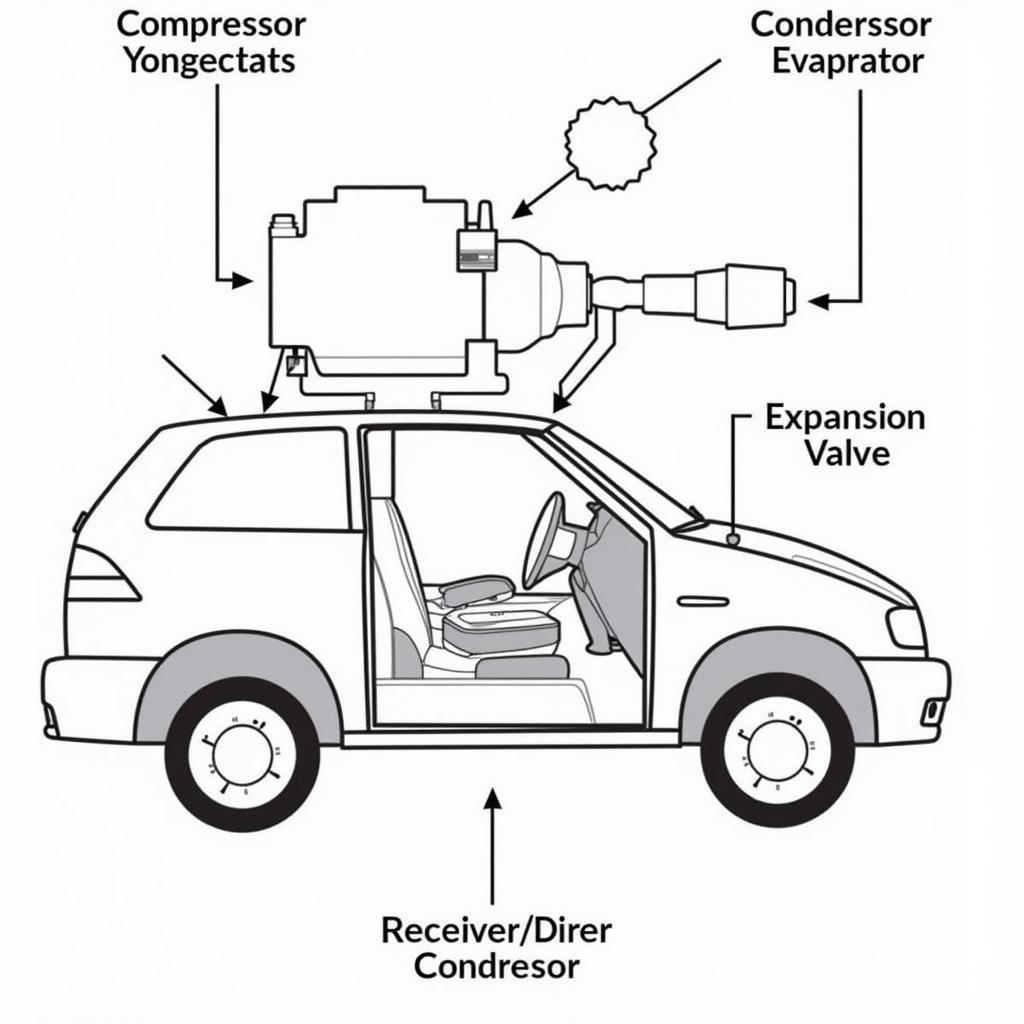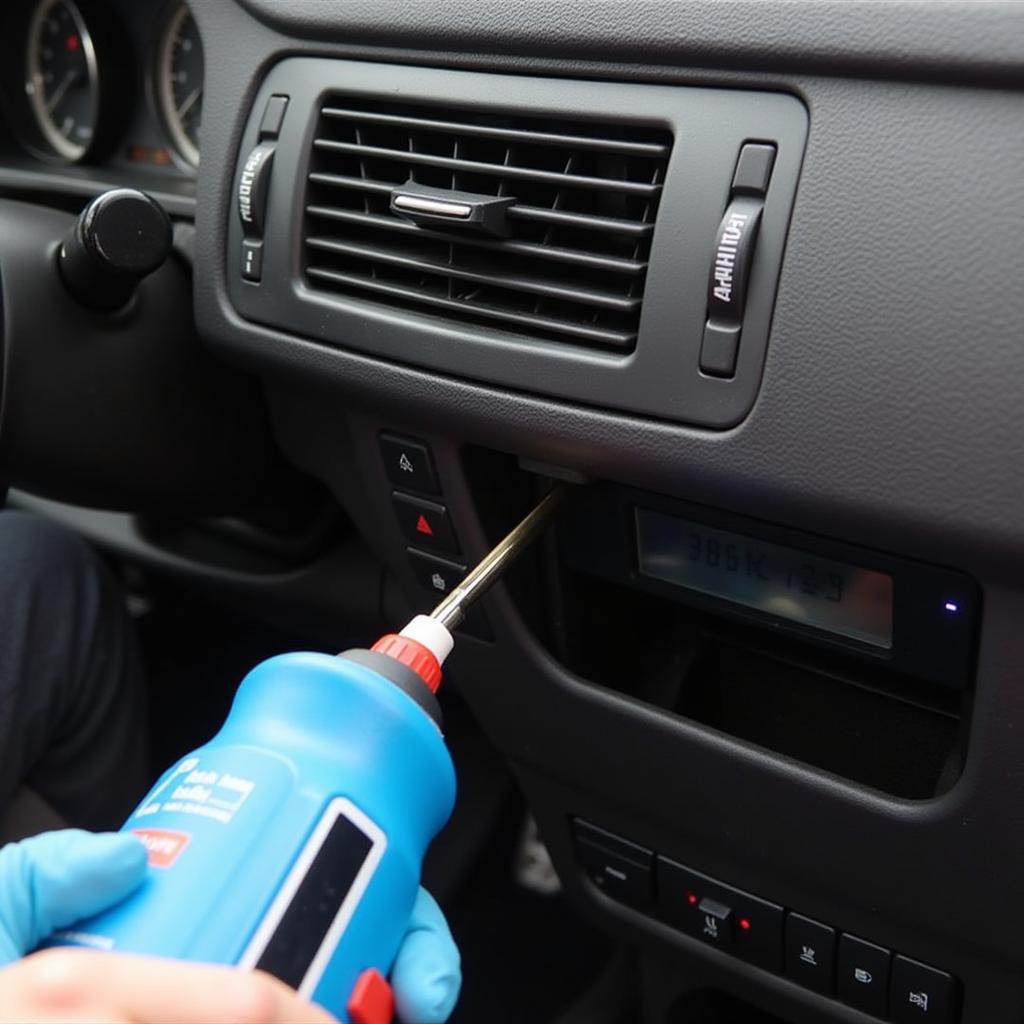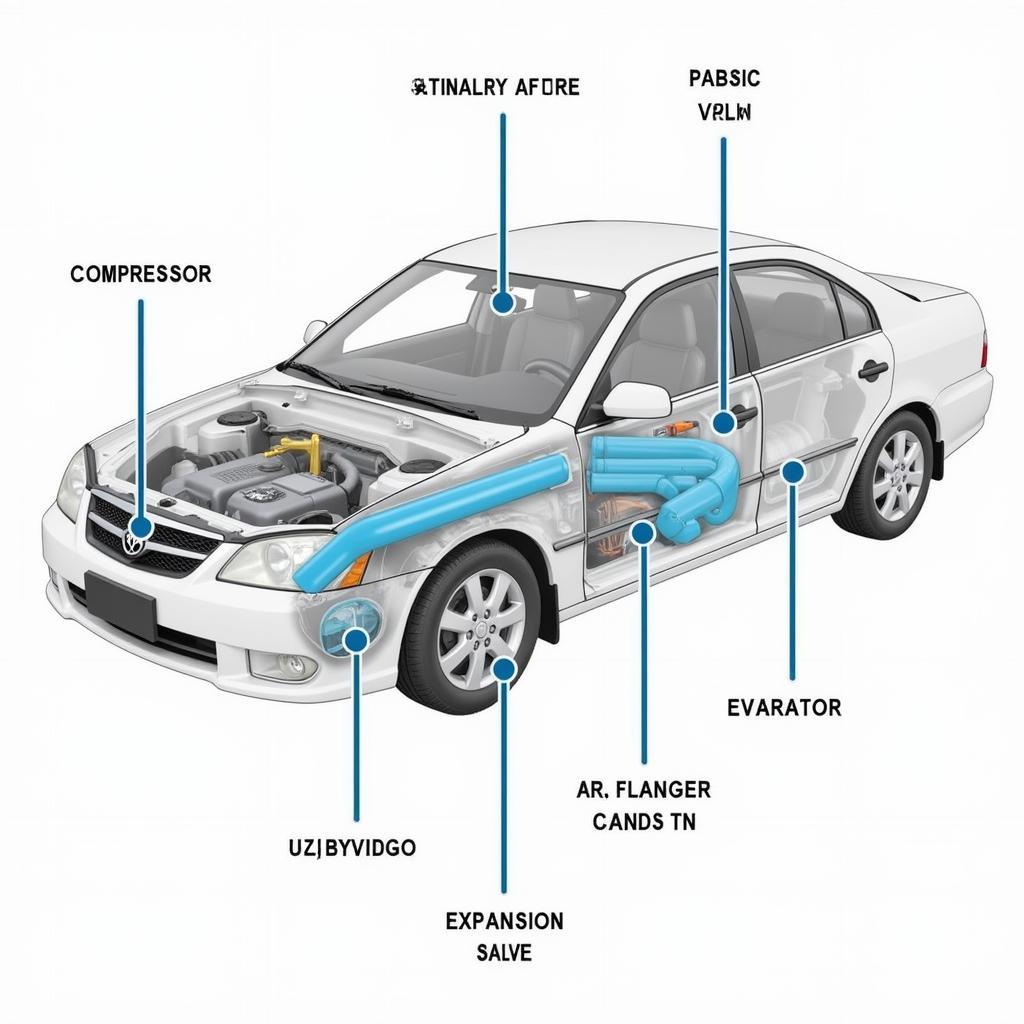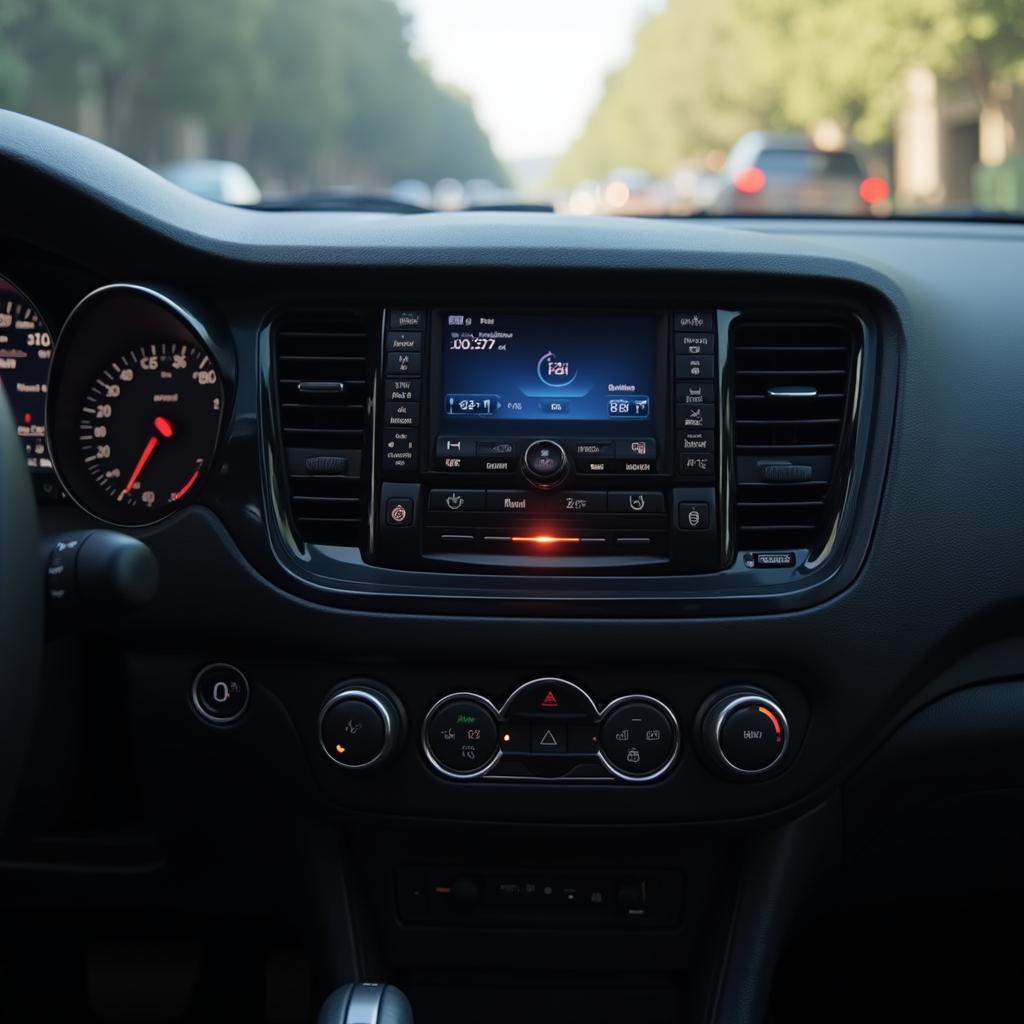
Car AC blowing hot air
Imagine this: It’s a scorching summer day, and you’re cruising down the highway. You reach for the AC, expecting a blast of cool air, but instead, you’re met with a disappointing puff of warm air. Suddenly, that long drive feels a whole lot longer. Don’t sweat it! Understanding the ins and outs of car air conditioning repair can save you from those sweltering situations and keep you comfortable behind the wheel, no matter the weather.
 Car AC blowing hot air
Car AC blowing hot air
Common Culprits Behind Car AC Trouble
Your car’s AC system is intricate, a network of components working in harmony to deliver that refreshing chill. When one element falters, the whole system can feel the heat. Here are some of the usual suspects behind car air conditioning repair needs:
-
Refrigerant Leak: Just like a refrigerator, your car AC relies on refrigerant to cool the air. Over time, leaks can develop in the hoses and seals, causing the refrigerant to escape and leaving you with lackluster cooling.
-
Compressor Issues: The compressor is the heart of the system, responsible for pressurizing and circulating the refrigerant. If it’s failing, you might notice strange noises, inconsistent cooling, or no cold air.
-
Condenser Problems: Positioned at the front of your vehicle, the condenser acts as a radiator for the refrigerant. A buildup of debris or damage to the fins can obstruct airflow, reducing cooling efficiency.
-
Electrical Gremlins: Electrical components, like the blower motor, resistor, and switches, play a crucial role in controlling the fan speed and air distribution. Malfunctions here can lead to weak airflow or complete system failure.
Recognizing the Warning Signs
Early detection is key to preventing more extensive and costly car air conditioning repair. Be on the lookout for these red flags:
-
Warm Air Instead of Cool: This is the most obvious sign that something’s amiss. If the air blowing from your vents is lukewarm or downright hot, your AC needs attention.
-
Weak Airflow: A gradual decrease in airflow from the vents can indicate a failing blower motor, a clogged cabin air filter, or blocked air ducts.
-
Unusual Noises: Grinding, squealing, or hissing sounds coming from the AC system, particularly when you turn it on, are often telltale signs of compressor issues or loose belts.
-
Foul Odors: A musty or unpleasant smell emanating from the vents could signal mold or mildew growth in the evaporator case, requiring cleaning or replacement.
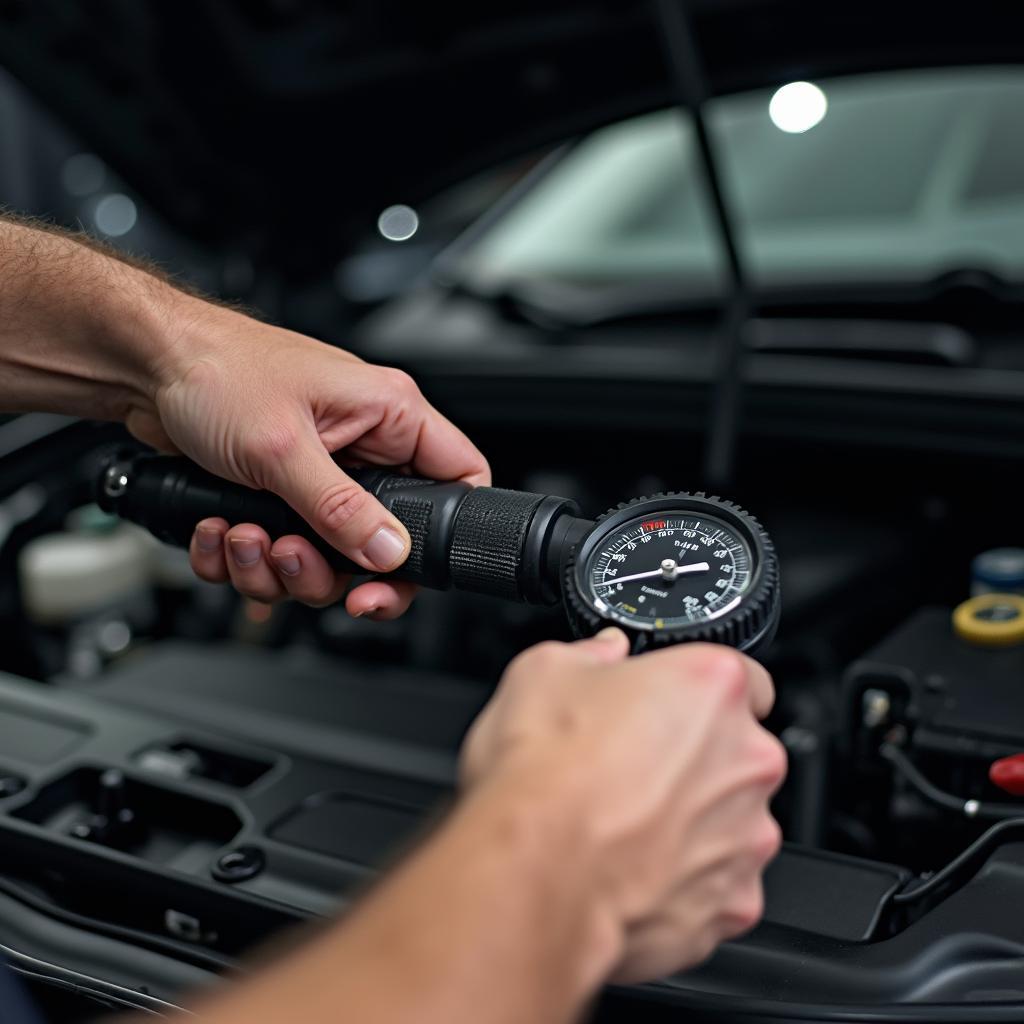 Mechanic inspecting car AC system
Mechanic inspecting car AC system
Navigating Car Air Conditioning Repair: What to Expect
When your car’s AC starts acting up, knowing how to proceed can save you time, money, and unnecessary headaches. Here’s a breakdown of what typically happens during car air conditioning repair:
-
Inspection and Diagnosis: A qualified mechanic will thoroughly inspect your AC system, checking for refrigerant levels, leaks, component functionality, and electrical issues. This step is crucial to pinpoint the root cause and determine the necessary repairs.
-
Repair or Replacement: Based on the diagnosis, the mechanic will recommend either repairing or replacing the faulty component(s). Common repairs include refrigerant recharge, leak sealing, compressor replacement, condenser cleaning or replacement, and electrical component repair.
-
System Testing: Once repairs are complete, the mechanic will thoroughly test the AC system to ensure it’s functioning correctly, achieving the desired temperature and airflow.
The Cost of Staying Cool: Car Air Conditioning Repair Costs
The cost of car air conditioning repair can vary significantly depending on the make and model of your vehicle, the severity of the problem, and the location of the repair shop. Simple repairs, such as refrigerant recharges, can be relatively inexpensive, ranging from $100 to $300. However, more complex issues, such as compressor replacement, can set you back $1,000 or more.
Preventive Measures for a Cool and Comfortable Ride
Just like any other part of your vehicle, regular maintenance is essential to keep your car’s AC system running smoothly and prevent costly repairs down the road.
-
Regular AC Service: Schedule an annual AC check-up with a qualified mechanic to have the refrigerant levels checked, leaks addressed, and components inspected.
-
Cabin Air Filter Replacement: Replace your cabin air filter every 12,000 miles or as recommended in your owner’s manual. This simple step can improve airflow, prevent foul odors, and protect the AC system from debris.
-
Visual Inspections: Periodically check under the hood for any signs of damage, leaks, or debris buildup around the AC components.
-
Run the AC Regularly: Even during the cooler months, it’s a good idea to run your AC for a few minutes every week. This helps to keep the refrigerant circulating, lubricates the seals, and prevents the system from seizing up.
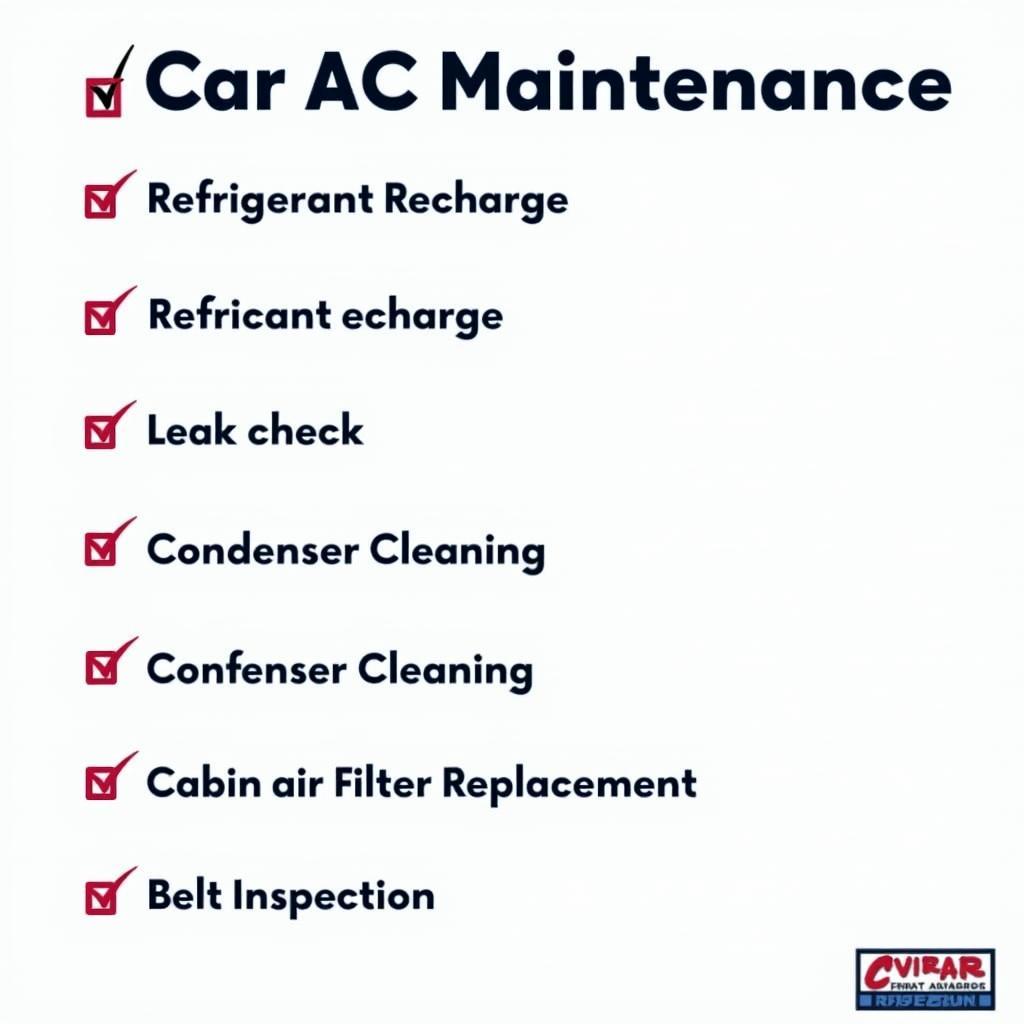 Car AC maintenance checklist
Car AC maintenance checklist
Keeping Your Cool: A Priority, Not a Luxury
Car air conditioning repair might not be the most exciting topic, but it’s undoubtedly essential for a comfortable and enjoyable driving experience. By understanding the common causes of AC problems, recognizing the warning signs, and following preventive maintenance tips, you can stay cool and collected behind the wheel, no matter how hot it gets outside. Remember, when it comes to your car’s AC, proactive care is always better (and cheaper!) than reactive repair.
FAQs: Addressing Your Car AC Concerns
Q: Why is my car AC blowing cold air on one side but hot air on the other?
A: This usually indicates a problem with the blend door actuator or the temperature blend door itself. These components control the mix of hot and cold air, and if they malfunction, it can result in uneven temperature distribution.
Q: How often should I recharge my car’s AC?
A: A well-maintained AC system should not require frequent recharges. If your system needs recharging more than once every few years, it likely has a leak that needs to be addressed.
Q: Can I add refrigerant to my car’s AC myself?
A: While DIY refrigerant recharge kits are available, it’s generally not recommended unless you have the proper knowledge, tools, and safety precautions. Incorrect handling of refrigerant can be dangerous and can damage your AC system.
Q: Why does my car AC smell bad when I turn it on?
A: A musty or unpleasant odor coming from the vents is often caused by mold or mildew growth in the evaporator case or air ducts. This can happen due to moisture buildup in the system.
Q: How can I tell if my car AC compressor is bad?
A: Signs of a failing compressor include loud noises (grinding, squealing, or clicking) coming from the AC system, inconsistent cooling, and no cold air at all.
Do you have any other questions about car air conditioning repair? Contact us via WhatsApp at +1(641)206-8880 or email us at [email protected]. Our 24/7 customer support team is here to assist you.
For more information on car maintenance and repair, explore our other helpful articles on [CarRepairOnline](your website link here).

